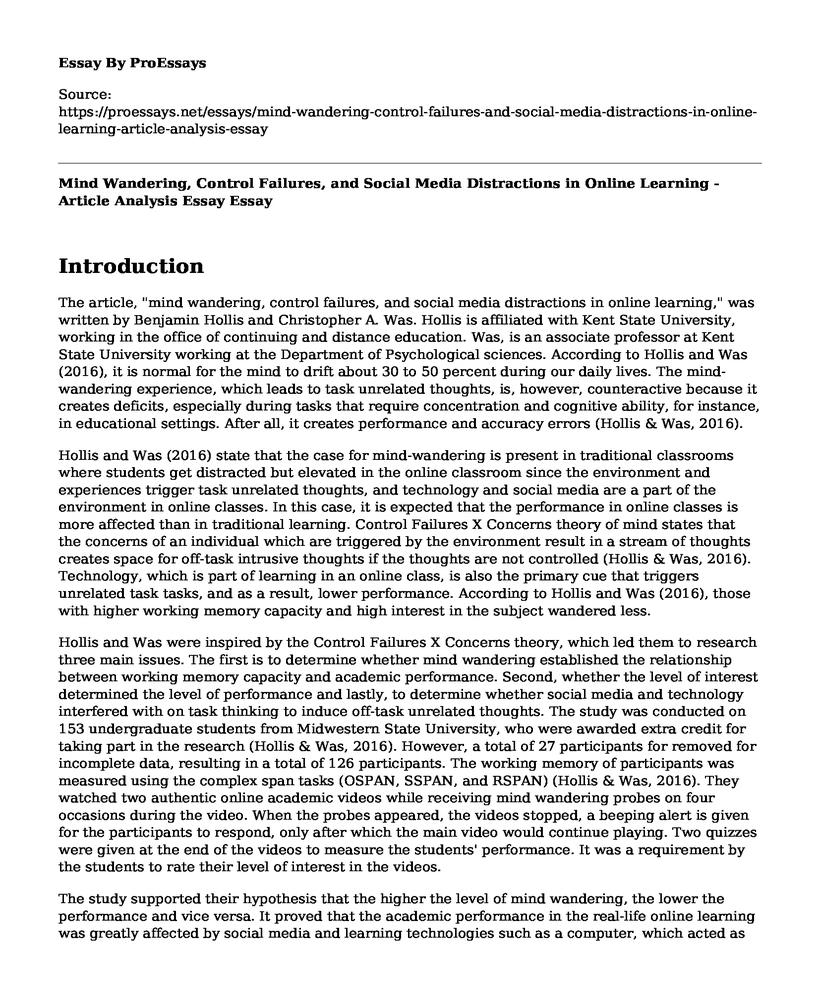Introduction
The article, "mind wandering, control failures, and social media distractions in online learning," was written by Benjamin Hollis and Christopher A. Was. Hollis is affiliated with Kent State University, working in the office of continuing and distance education. Was, is an associate professor at Kent State University working at the Department of Psychological sciences. According to Hollis and Was (2016), it is normal for the mind to drift about 30 to 50 percent during our daily lives. The mind-wandering experience, which leads to task unrelated thoughts, is, however, counteractive because it creates deficits, especially during tasks that require concentration and cognitive ability, for instance, in educational settings. After all, it creates performance and accuracy errors (Hollis & Was, 2016).
Hollis and Was (2016) state that the case for mind-wandering is present in traditional classrooms where students get distracted but elevated in the online classroom since the environment and experiences trigger task unrelated thoughts, and technology and social media are a part of the environment in online classes. In this case, it is expected that the performance in online classes is more affected than in traditional learning. Control Failures X Concerns theory of mind states that the concerns of an individual which are triggered by the environment result in a stream of thoughts creates space for off-task intrusive thoughts if the thoughts are not controlled (Hollis & Was, 2016). Technology, which is part of learning in an online class, is also the primary cue that triggers unrelated task tasks, and as a result, lower performance. According to Hollis and Was (2016), those with higher working memory capacity and high interest in the subject wandered less.
Hollis and Was were inspired by the Control Failures X Concerns theory, which led them to research three main issues. The first is to determine whether mind wandering established the relationship between working memory capacity and academic performance. Second, whether the level of interest determined the level of performance and lastly, to determine whether social media and technology interfered with on task thinking to induce off-task unrelated thoughts. The study was conducted on 153 undergraduate students from Midwestern State University, who were awarded extra credit for taking part in the research (Hollis & Was, 2016). However, a total of 27 participants for removed for incomplete data, resulting in a total of 126 participants. The working memory of participants was measured using the complex span tasks (OSPAN, SSPAN, and RSPAN) (Hollis & Was, 2016). They watched two authentic online academic videos while receiving mind wandering probes on four occasions during the video. When the probes appeared, the videos stopped, a beeping alert is given for the participants to respond, only after which the main video would continue playing. Two quizzes were given at the end of the videos to measure the students' performance. It was a requirement by the students to rate their level of interest in the videos.
The study supported their hypothesis that the higher the level of mind wandering, the lower the performance and vice versa. It proved that the academic performance in the real-life online learning was greatly affected by social media and learning technologies such as a computer, which acted as environmental cues for streams of thoughts, and unrelated task thoughts. The levels of performance created from mind-wandering found from this research were similar to those from previous findings.
References
Hollis, R.B. & Was, C.A. (2016). Mind wandering, control failures, and social media distractions in online learning. Learning and Instruction, 42, 104-112.
Cite this page
Mind Wandering, Control Failures, and Social Media Distractions in Online Learning - Article Analysis Essay. (2023, Apr 20). Retrieved from https://proessays.net/essays/mind-wandering-control-failures-and-social-media-distractions-in-online-learning-article-analysis-essay
If you are the original author of this essay and no longer wish to have it published on the ProEssays website, please click below to request its removal:
- Favorite Films of Different Generations
- Introduction to Adaptation as a Disciplinary Approach Paper Example
- Essay Sample on Media and Biases
- Film Analysis Essay on Do the Right Thing: Racial Tension in the Business World
- Film Analysis Essay on Sling Blade: A Serious Movie by Billy Bob Thornton
- Movie Analysis Essay on The Yellow Earth, Timbuktu and The Red Sorghum
- Cinema Attraction: From Silent Films to Postmodern Era - Essay Sample







